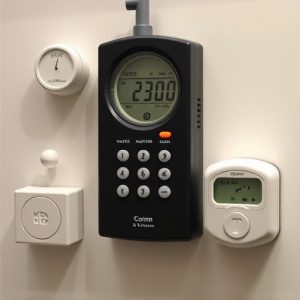Rechargeable vs Battery Personal Alarms: Monitoring for Enhanced Safety
When choosing between rechargeable and battery-powered personal panic alarms, consider trade-offs be…….
When choosing between rechargeable and battery-powered personal panic alarms, consider trade-offs between cost/environmentalism (rechargeables) and instant accessibility/convenience (battery-powered). Rechargeables are economical and eco-friendly with longer durations, while batteries offer immediate deployment for urgent needs. Both options enhance safety through alert transmission, with rechargeables ideal for sustained use and battery-powered alarms catering to those needing rapid deployment without charging.
“In today’s world, personal safety is paramount. Body-worn panic alarms offer a powerful tool for individuals seeking peace of mind, especially in high-risk environments. This article delves into the intricacies of these life-saving devices, focusing on understanding their core features and benefits.
We present a detailed comparison between rechargeable and battery-powered models, highlighting advantages and drawbacks. Furthermore, we explore monitoring systems that revolutionize safety, ensuring help arrives swiftly during emergencies. Get ready to uncover the ultimate guide to choosing and maximizing the potential of your body-worn panic alarm.”
- Understanding Body-Worn Panic Alarms: Features and Benefits
- Rechargeable vs Battery Powered Personal Alarms: A Comprehensive Comparison
- Monitoring Systems for Body-Worn Alarms: Enhancing Safety and Peace of Mind
Understanding Body-Worn Panic Alarms: Features and Benefits
Body-worn panic alarms are portable devices designed to provide personal safety, offering a discrete yet powerful tool for individuals who may need quick assistance or want peace of mind. These alarms come with various features tailored to different needs. One key distinction lies in their power source: rechargeable versus battery-powered personal alarms.
Rechargeable options are growing in popularity due to their sustainability and cost-effectiveness over time. They can be continuously topped up, eliminating the need for frequent replacements. On the other hand, battery-powered alarms offer immediate readiness and convenience, as they don’t require charging but rather disposable or replaceable batteries. Each type has its advantages, catering to users’ preferences and priorities regarding accessibility, environmental impact, and long-term use.
Rechargeable vs Battery Powered Personal Alarms: A Comprehensive Comparison
When considering a body-worn panic alarm, one of the key decisions is between rechargeable and battery-powered options. Rechargeable vs Battery Personal Alarms present distinct advantages and considerations. On one hand, rechargeable alarms offer cost-effectiveness and environmental friendliness due to reduced battery waste. These devices can be continuously used and charged, eliminating the need for frequent battery replacements. Moreover, rechargeables often feature longer durations between charges, ensuring users remain protected for extended periods.
In contrast, battery-powered alarms are known for their convenience and immediate readiness. They require no charging time and offer quick activation upon depletion, making them ideal for situations where rapid deployment is crucial. While single-use batteries may contribute to electronic waste, many modern battery-powered alarms have adopted eco-friendly lithium batteries with longer lifespans, balancing convenience with sustainability.
Monitoring Systems for Body-Worn Alarms: Enhancing Safety and Peace of Mind
Monitoring systems for body-worn alarms play a pivotal role in enhancing safety and providing peace of mind, especially in situations where quick response times are crucial. These monitoring solutions allow users to transmit alerts to designated receiving centers or emergency contacts when activated, ensuring prompt assistance during distressing events. Advanced monitoring technologies offer real-time tracking, enabling authorities or caregivers to locate the individual in need swiftly.
Rechargeable vs. battery-powered personal alarms is a key consideration in choosing an effective monitoring system. Rechargeable options provide cost savings and environmental benefits by reducing waste from disposable batteries. Moreover, these devices often come with longer operational durations between charges, ensuring continuous protection. On the other hand, battery-powered alarms offer instant readiness and are ideal for individuals in constant motion who require immediate deployment without worrying about charging schedules.
Body-worn panic alarms, equipped with monitoring systems, offer unparalleled peace of mind. By understanding their features, benefits, and the advantages of rechargeable vs battery-powered models, individuals can make informed decisions to enhance personal safety. Monitoring systems for these devices play a pivotal role in ensuring swift response times and increased security, making them invaluable tools in today’s world.


